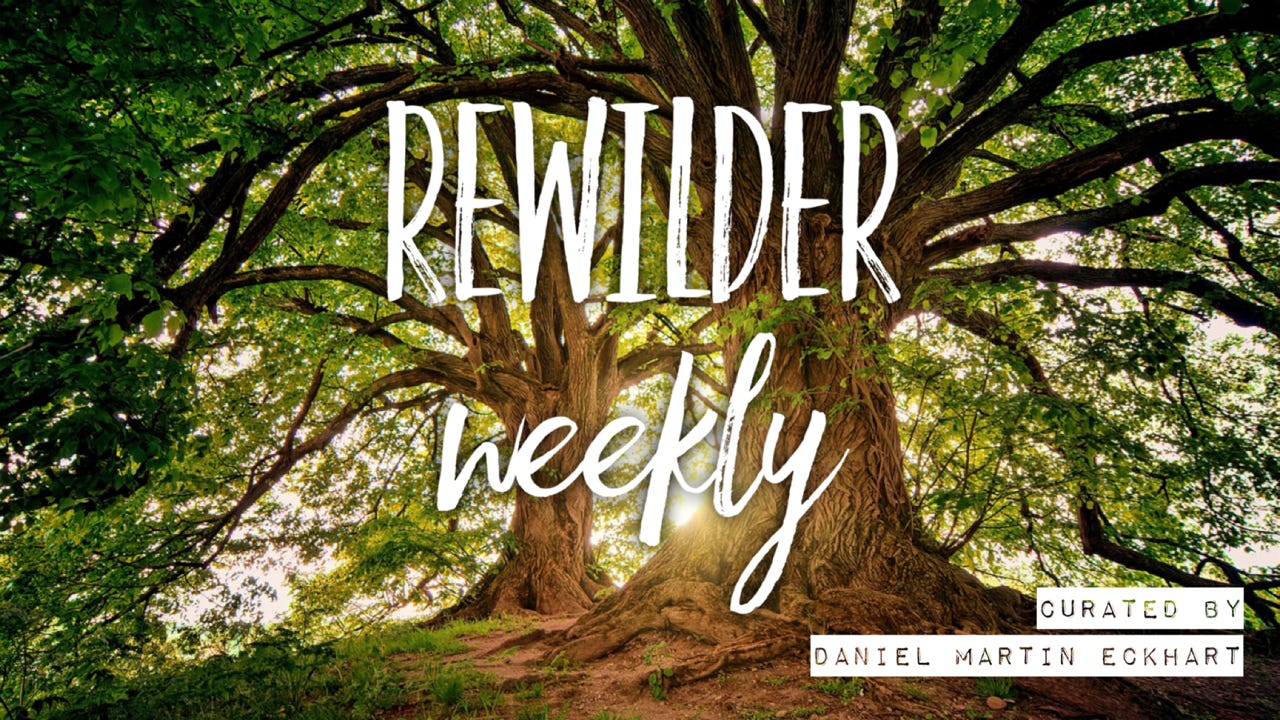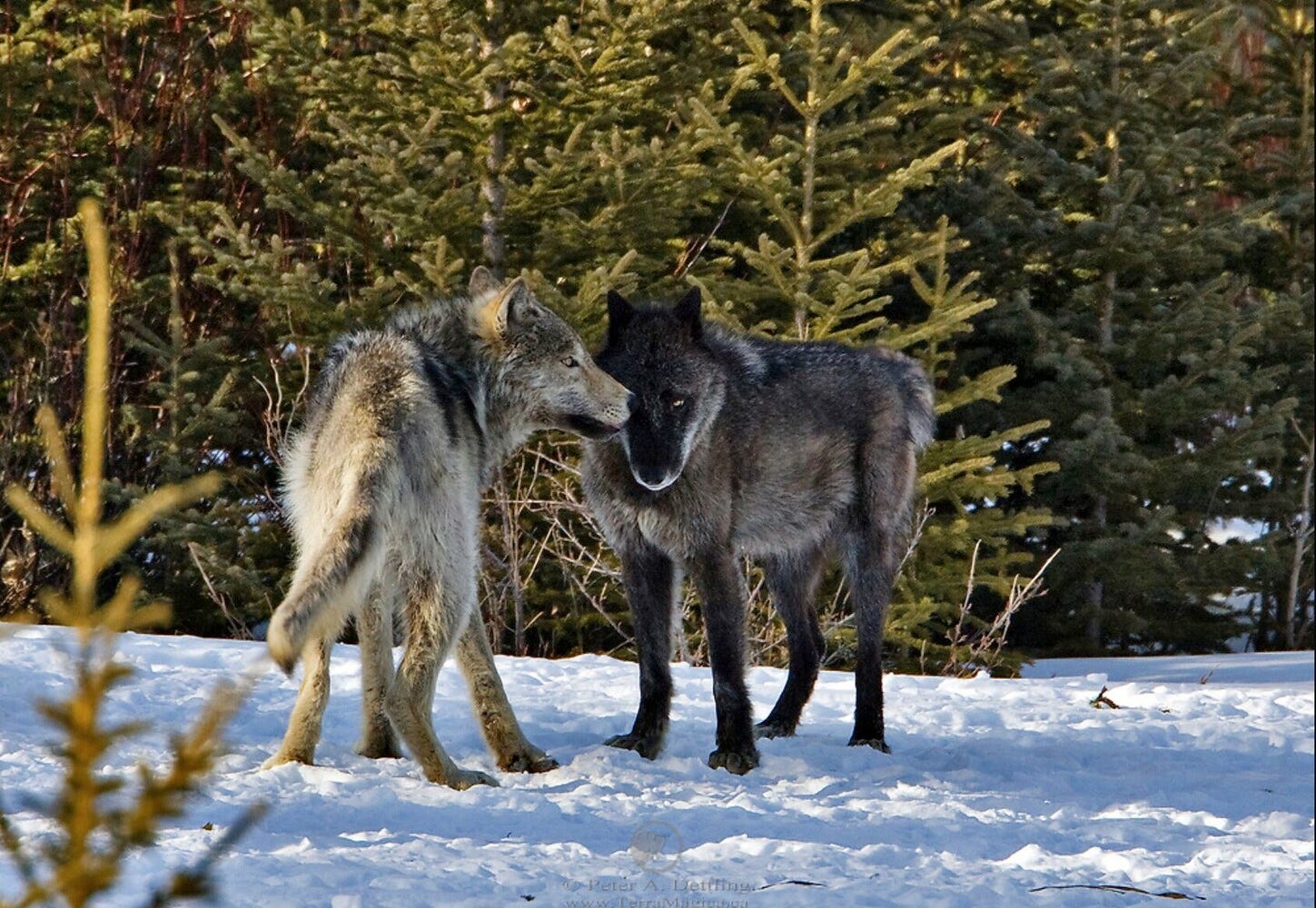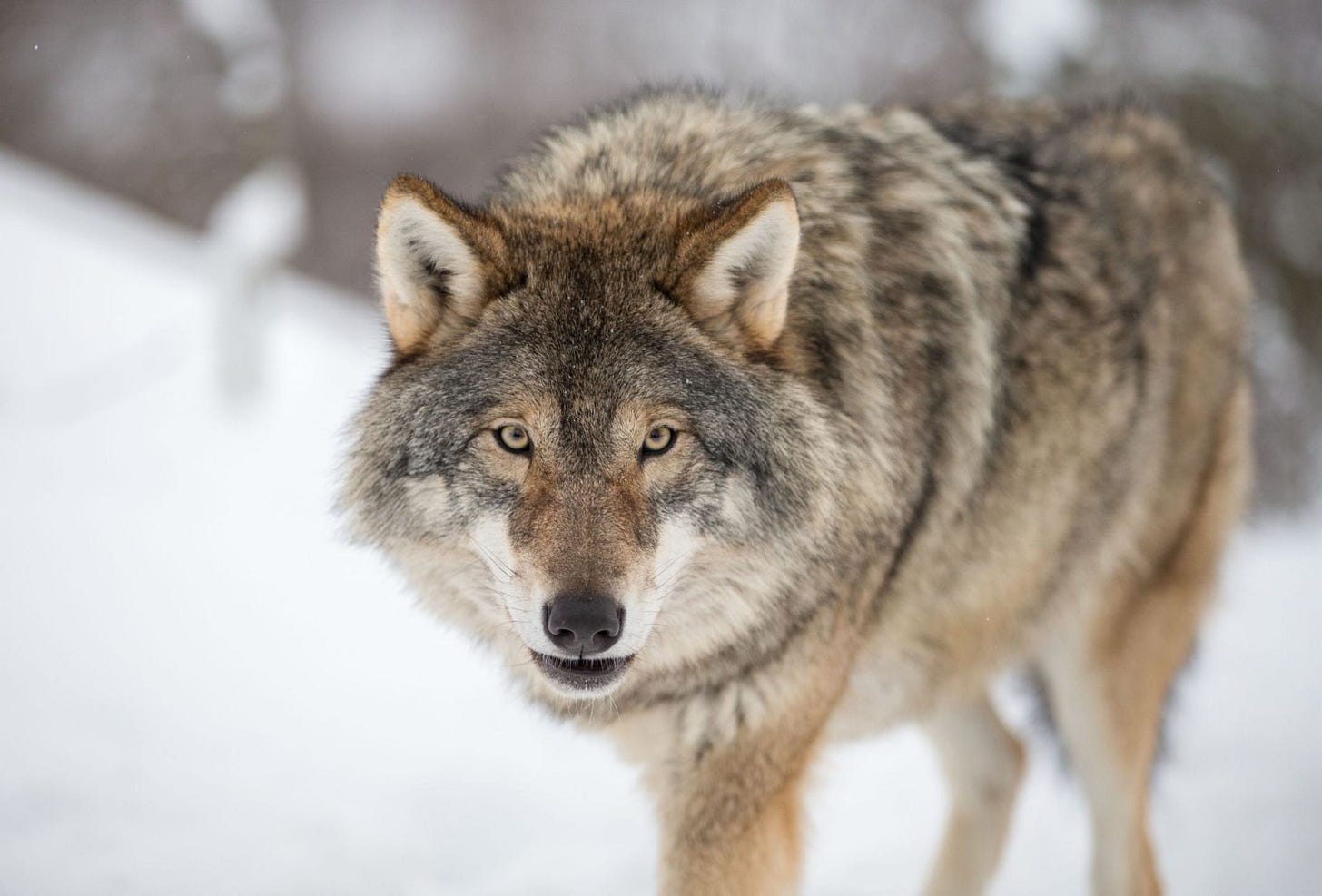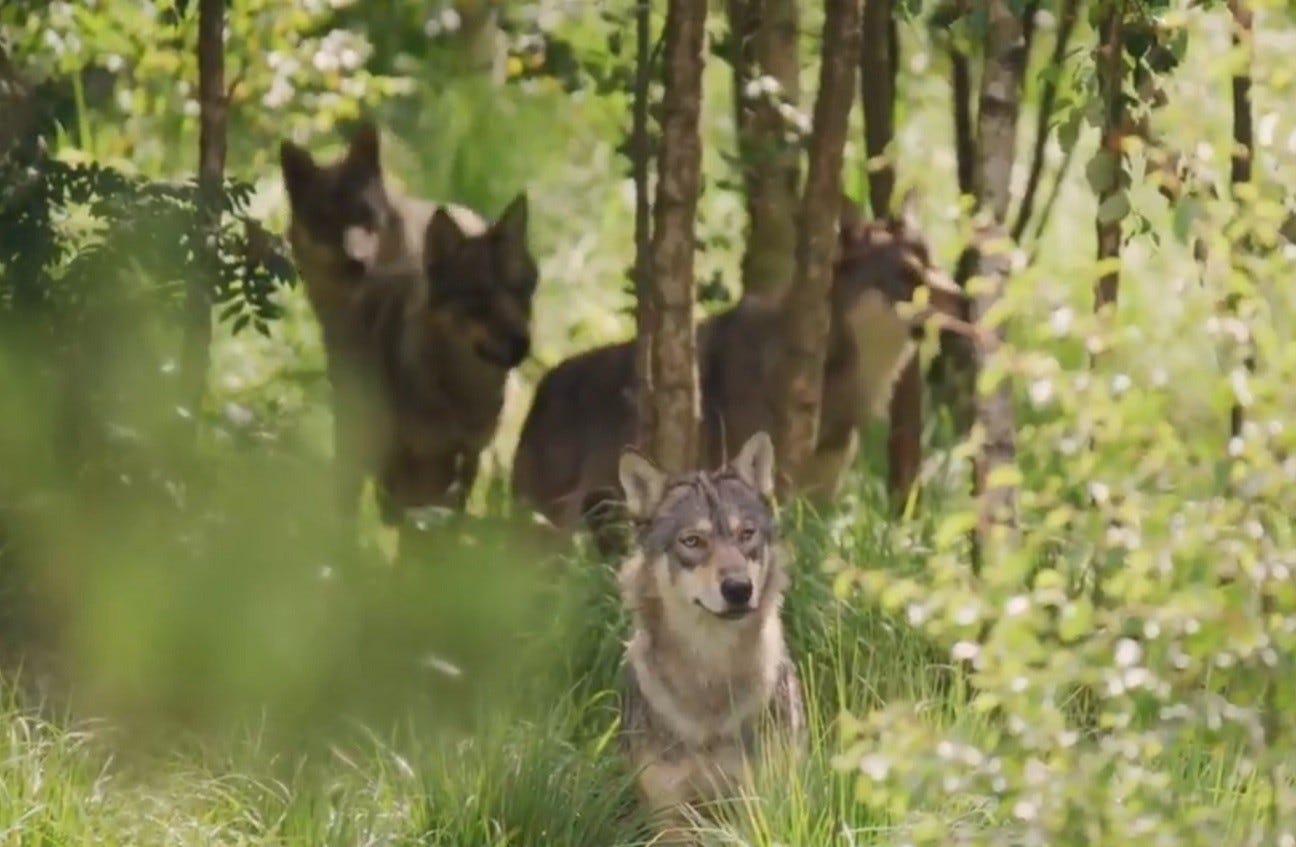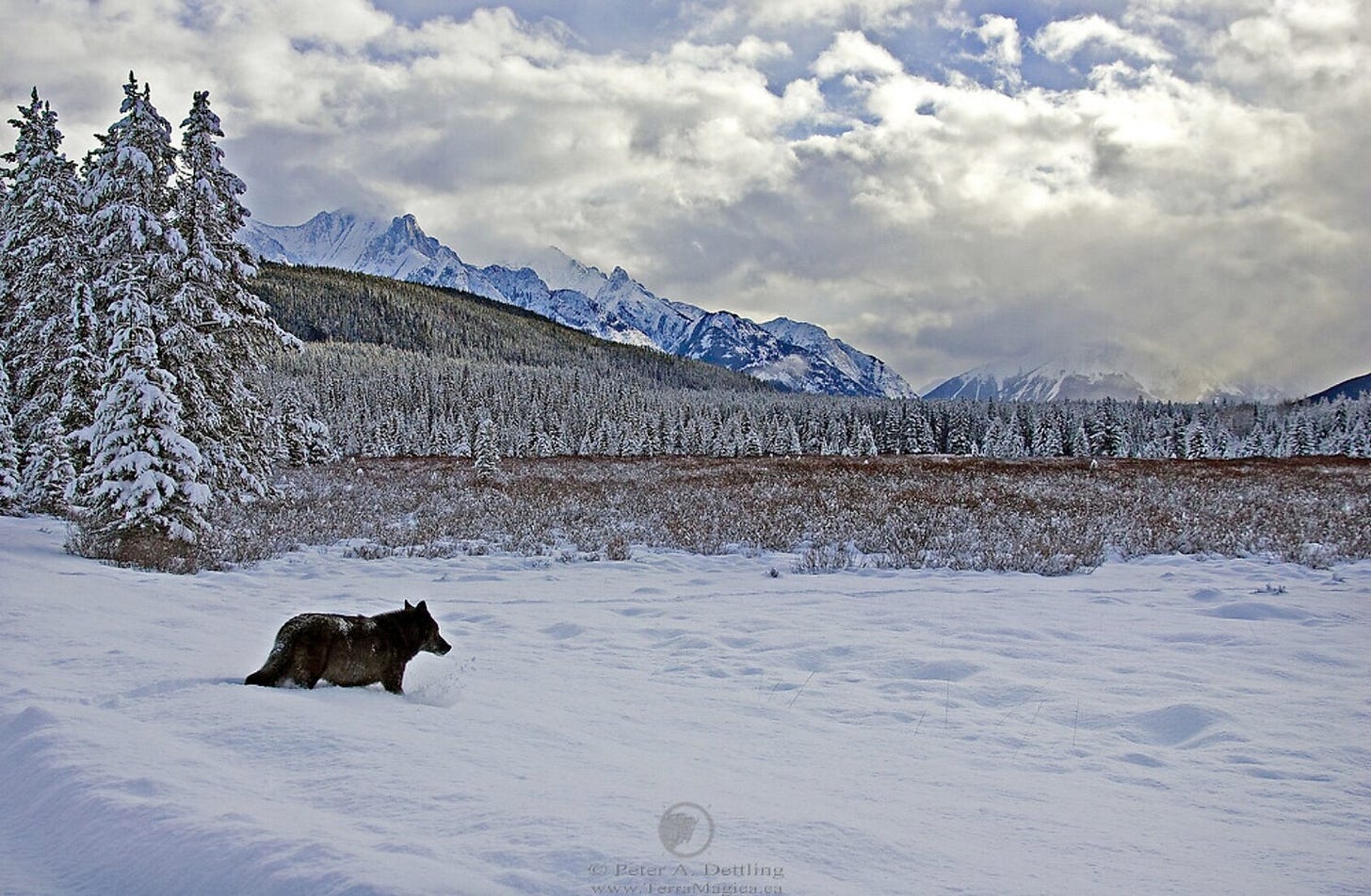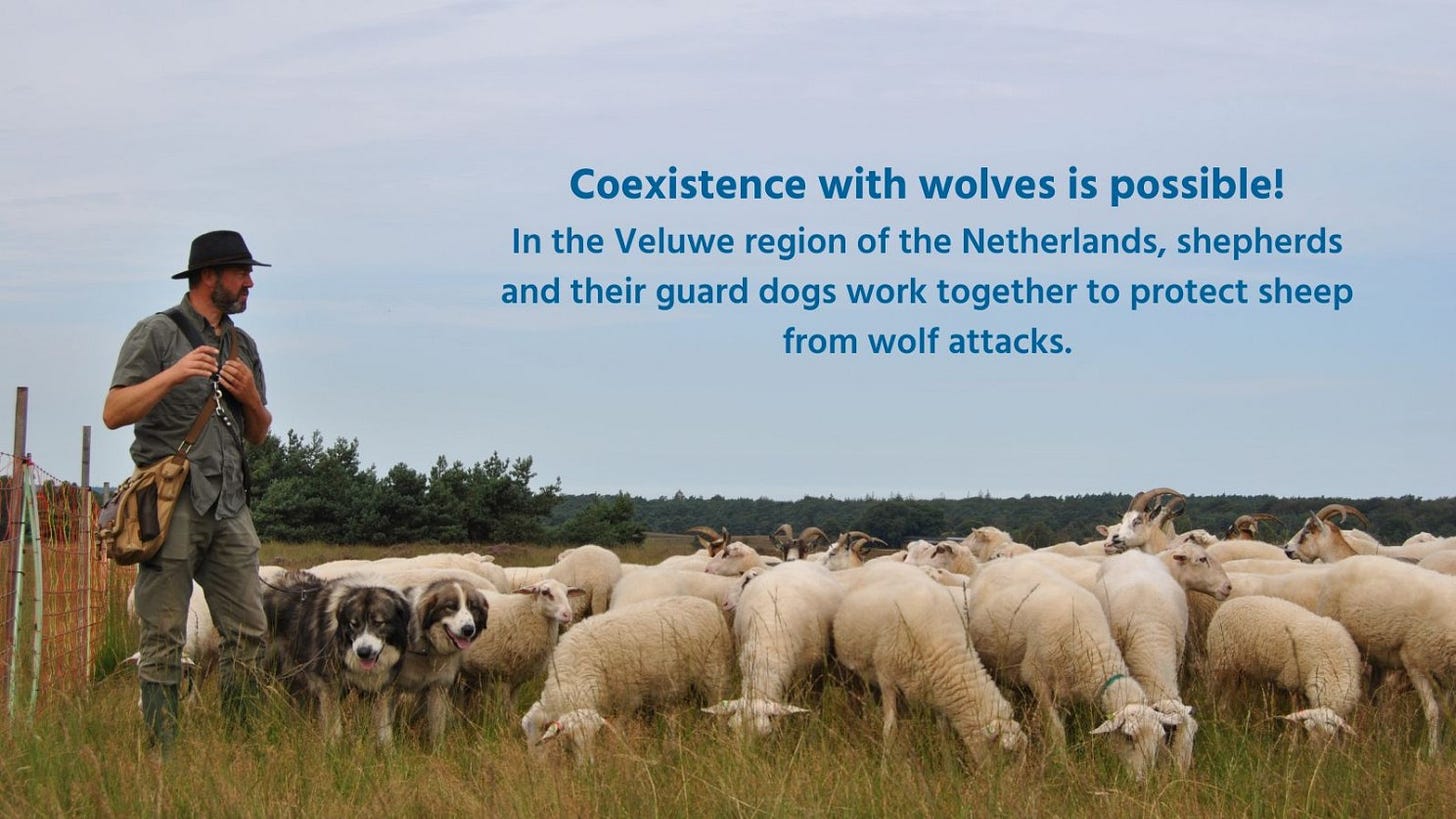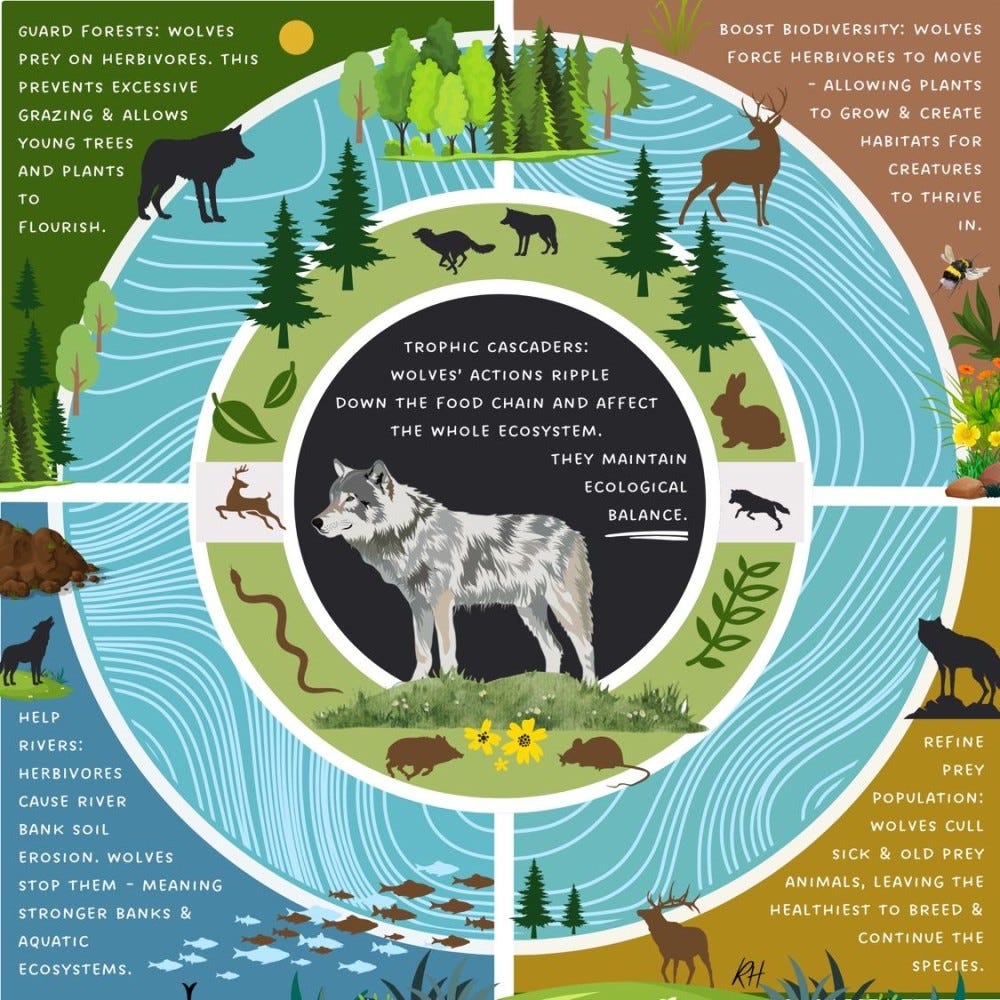Welcome to this special edition of the Rewilder Weekly! As you know, in my weekly newsletter I usually share broad selection of rewilding stories. But there's so much going on - and going wrong - with the wolf and the fearmongering lobbies screaming for widespread slaughter, I felt I needed to insert a special edition focused on nothing but the wolf.
For a truly functioning, biodiversity-rich environment, the wolf is essential - and yet coexistence measures are only happening here and there, while fearmongering and calls for widespread slaughter are embraced by governments. The slaughter continues to happen against better judgement, against every scientific insight.
August 13th marked International Wolf Day. If you follow the link you'll see that it's not all bad news. The article looks at wolf sentiment in Canada, where 60'000 grey wolves (a large chunk of roughly 250'000 worldwide) live. A 2023 survey found that Canadians have gone from fearing wolves to loving wolves. Mind you, for indigenous nations the wolf was never in question. A fierce predator, sure, but also a gifted hunter, a brother in nature. Wolves are associated with courage and strength and loyalty and some Native American tribes know Wolf as the creator (with Coyote his mischievous, Loki-like, brother). But don't think it's all good wolf news in Canada. For a very different picture, check out the 5th story below.
The next regular edition of the Rewilder Weekly will go live as usual, this coming Tuesday. For now, read up on the wolf with below selected stories. And when you read or hear wolf-fearmongering, join the conversations and help educate. The propaganda on the pro-slaughter side is just that, propaganda - it is false, it is hyperbolic and it has nothing to do with scientific fact. Whenever you can: SET - THE - RECORD - STRAIGHT.
On with the wolf stories!
1) Time for compassionate coexistence
In her post, the tireless advocate for wolf protection Lucie Wuethrich writes about increasing push for wolf slaughter across Europe, and particularly so in Switzerland. She says, "Wolves are coming under increasing pressure, not least in Europe where old fears, fables and prejudices are being resurrected to justify weakening their protection and allow for mass culling. Switzerland is spearheading the initiative and could see its native, supposedly protected lupine numbers reduced by up to 70%, well below the minimum sustainable population required to ensure the survival of the species in Switzerland."
The slaughter would leave Switzerland with that minimum viable population ... they say. But that is utter rubbish. If we really want the biodiversity-rich nature we claim to want, then nothing should be 'minimum viable' - we must allow nature to flow, to thrive - and not just the wolf but everywhere - if we allow that, if we have the courage and the wisdom to step back (and get off our high horse), then wolves will do what wolves do and biodiversity-rich nature will make a dramatic comeback.
👉 Go here for Lucie's post (and Peter Dettling's fantastic gallery)
2) "We reached the old wolf in time to ..."
" ... watch a fierce green fire dying in her eyes. I realized then, and have known ever since, that there was something new to me in those eyes - something known to only her and the mountain. I was young then, and full of trigger-itch; I thought that because fewer wolves meant more deer, that no wolves would mean hunters' paradise. But after seeing the green fire die, I sensed that neither the wolf nor the mountain agreed with such a view."
The above is from Aldo Leopold's early 20th century essay "Thinking Like a Mountain" and it is shared by Daniel Allen in his recent post about the importance of the wolf. Daniel writes about the Leopold's experience when working as a forester in the U.S. in 1909. "It is sometimes thought to be a tale of Leopold's sudden comprehension of the nobility of wolves. In fact, it's a poetic tale about how a far-sighted Leopold learned to see wolves and other predatory animals as integral parts of wild nature - vital members of ecosystems that are far healthier with their predators than without them."
👉 Go here for post and article
3) The wolf's return to Europe's landscapes
On the occasion of International Wolf Day, Rewilding Europe shared the above artistic rendering about the importance of this keystone species and writes, "The wolf's return to Europe's landscapes marks one of the greatest wildlife comeback stories of our time. These majestic animals play a crucial role in maintaining the health of our ecosystems, sustaining myriad of other species, but their resurgence also brings challenges, particularly for those living alongside them."
Rewilding Europe highlights the lack of scientific evidence to prove that killing wolves reduces depredation on farmed animals. If you just take the time to read up on it you'll learn how counterproductive wolf slaughter really is. There are proven coexistence strategies - but some lobbies clearly prefer the nonsensical option that allows them to hunt and slaughter instead. Rewilding Europe explains that, "The EU's proposition to reduce wolf protection undermines all ongoing efforts and investments to achieve coexistence between local communities and wolf populations."
👉 Go here for post and o sign the petition to stop wolf hunting in Europe!
4) Wolves don't have to be a danger for livestock
In the post by Eurogroup for Animals, journalist Paul Krantz shares his insights from extensively talking to both farmers and scientists. It's a 3min video clip that is quite illuminating. Learn what farmers told Krantz about the value of electric fences and the joy of having wolf packs nearby. He of course also highlights the nonsense of killing wolves in the hope of fewer livestock predations. As examples across Europe show, if you kill wolves, you disrupt well-functioning packs - and that leads to more predation, not less.
Krantz argues for coexistence with wolves across Europe and says that "The most important thing that policymakers need to focus on is not to politicize wolves, not to jump at populist speaking points that tend to stir up fear and make people anxious about wolves. At the very least, just stick to the facts. I've heard from policymakers at the highest levels of the EU making claims that wolves are dangerous to people. And that is just factually incorrect. There have been no wolf attacks on people in Europe in recorded history."
👉 Go here for post and video as well as Krantz' article
5) Wolf hunting by helicopter in British Columbia
In the opening of this newsletter, I shared that Canadians, according to a 2023 survey, were more and more positive about the wolf - and especially so in rural communities. Alas, a survey is one thing (and I'm sure there's some statistical truth to it all), but Lucie Wuethrich's post about the extensive wolf slaughter in British Columbia paints a very different picture.
This is quite a story - and asking fundamental questions about both ethics and ecology. You see, the wolf slaughter en masse is happening to protect endangered caribou herds. Lucy writer that, "1,944 BC wolves were despatched from 2015 to March 2023 at a cost to the tax payer in excess of C$10 million. Cougars, bears and coyotes are also killed through aerial gunning, trapping and poisoning. All to keep 13 mountain caribou herds from going extinct." As Lucy explains, the real culprit that endangers caribou is habitat destruction by logging companies.
6) Coexistence is for the benefit of everyone
To celebrate International Wolf Day, BirdLife Europe and Central Asia shared the above image and stories from Belgium, the Netherlands and Portugal to show that "living in harmony with wolves is not just a dream, but a reality."
The examples highlight, unsurprisingly, fencing solutions and guard dogs. Our last dog was a guard dog, a majestically huge white creature. For that pup we were the family, we were the herd. What a wonderful dog our Lilo was! I can tell you one thing, with Lilo around, you felt safe all all times. Locking doors? Why bother - Lilo was there and when she rose with a single growl, you knew something was up. On that note, read Baptiste Morizot's 'Ways of Being Alive'. Morizot is both philosopher and wolf tracker. In his book, he describes in detail how guard dogs protected the herd - fantastic read.
7) We need wolves
"We need wolves" is the beginning of Rosie Howell's post. Frankly, if we could just imprint the clarity of trophic cascades into people's minds, the slaughter of wolves would stop. Like that. Alas, we can't and - as Dostoevsky explains in his illuminating 'Notes from Underground' - our species gets a kick out of doing the obviously wrong thing.
As Rosie highlights, "Wolves are forest guardians, biodiversity boosters, river protectors and much more. They're an apex predator who solves a lot of problems for us - and for nature. They're absolutely essential for ecosystem balance." In the opening paragraph of this special edition I've linked to an article about the wolf in Canada that also talks about the deep meaning the wolf has for Indigenous nations ... maybe, if we could just harness some of their respect for nature, some of their beliefs and some of their stories - the wolf would have a place in our collective hearts.
👉 Go here for Rosie's post and illustration
8) And then there's this wonderful bit of wolf joy
Our friends at Rewilding Apennines managed to film a wolf mom and her three pups last month. All too often when people even just hear the word wolf, their mind takes a sharp turn into fear-land. Yes, they are apex predators - but, as you well know by now, they are also keystone species that help improve and enrich biodiversity wherever they are.
Watch the clip. And next time you hear the word wolf, maybe think of the above clip instead. Wolves are extremely social. Wolves form bonds with family members. Wolves show affection toward each other. Wolves value the lives of family and pack over their own, even sacrificing themselves if need be. When a member of the pack dies, wolves mourn. Let's be better. There is nothing smart and certainly nothing 'humane' about slaughtering wolves. We need more of them, not fewer. As Rewilding Apennines writes, "We need to show the benefits and positivity of wolves in this hard time for the species' perception by people!"
There you have it for this special 🐺 edition. Killing wolves equals killing nature. And since we are part of nature, we are killing ourselves. Wolf slaughter is nothing but a short-term thrill for lobbies that are willfully ignorant. It does not help nature in any way. Essentially, next time you hear or read about the slaughter of wolves, know that we are shooting ourselves. By killing wolves we actively and rapidly reduce the chances for nature to recover in ways that help us combat the twin crises of biodiversity loss and climate change.
Alrighty then - back to the regular Rewilder Weekly next Tuesday.
Have a good week!
Cheers,
D





